This Week in Freethought History (February 10-16)
Here’s your Week in Freethought History: This is more than just a calendar of events or mini-biographies – it’s a reminder that, no matter how isolated and alone we may feel at times, we as freethinkers are neither unique nor alone in the world.
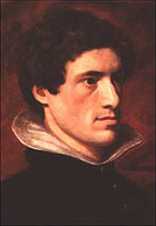 Last Sunday, February 10, but in 1775, British essayist Charles Lamb was born. Lamb’s London circle of friends favoring political reform included Percy Bysshe Shelley, William Hazlitt, Henry Brougham, Lord Byron, Thomas Barnes and Leigh Hunt. While clerking for the East India Company, Lamb wrote poems and essays in his idle time. He found little success until he, with his older sister Mary (1764-1847), wrote the children’s book Tales from Shakespeare (1807). Although he never reached the popularity of his friend Samuel Taylor Coleridge, Lamb became famous with a later work, Essays of Elia (1823-33), Elia being a pseudonym he used at London Magazine. In a letter to the poet Robert Southey, Lamb says, “The last sect with which you can remember me to have made common profession were the Unitarians.” Biographer Edward Verrall Lucas shows that Lamb was a complete agnostic from 1801, and from his 1829 edition of Elia included the Southey letter in his preface, explaining that the essayist was no longer even a Unitarian. Lamb never married, but looked after his institutionalized sister, Mary, until his death on 29 December 1834.
Last Sunday, February 10, but in 1775, British essayist Charles Lamb was born. Lamb’s London circle of friends favoring political reform included Percy Bysshe Shelley, William Hazlitt, Henry Brougham, Lord Byron, Thomas Barnes and Leigh Hunt. While clerking for the East India Company, Lamb wrote poems and essays in his idle time. He found little success until he, with his older sister Mary (1764-1847), wrote the children’s book Tales from Shakespeare (1807). Although he never reached the popularity of his friend Samuel Taylor Coleridge, Lamb became famous with a later work, Essays of Elia (1823-33), Elia being a pseudonym he used at London Magazine. In a letter to the poet Robert Southey, Lamb says, “The last sect with which you can remember me to have made common profession were the Unitarians.” Biographer Edward Verrall Lucas shows that Lamb was a complete agnostic from 1801, and from his 1829 edition of Elia included the Southey letter in his preface, explaining that the essayist was no longer even a Unitarian. Lamb never married, but looked after his institutionalized sister, Mary, until his death on 29 December 1834.
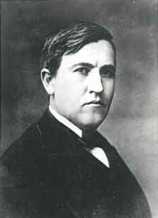 Last Monday, February 11, but in 1847, American inventor Thomas Edison was born. Home schooled by his mother, Edison vowed at the age of 12 to read the entire contents of the Detroit Public Library, foot by foot. By age ten Edison had read fifteen feet, including Thomas Paine’s Age of Reason, on which he commented, “I can still remember the flash of enlightenment that shone from his pages.” As for education generally, Edison said, “I do not believe that any type of religion should ever be introduced into the public schools of the United States.” Edison set up the first commercial research laboratory and invented the first successful incandescent electric light, the phonograph, the movie projector, the carbon telephone transmitter, and eventually held 1,093 U.S. patents. His parallel skill at commercializing his inventions made “the wizard of Menlo Park” a wealthy man. Edison is famous for saying, “Genius is one per cent inspiration, ninety-nine per cent perspiration.” An agnostic from his youth, Edison once said, “All Bibles are man-made” and “Religion is all bunk.” Later, attempting to soften the public reaction to his blunt Atheism, Edison remarked, “I have never seen the slightest scientific proof of the religious theories of heaven and hell, of future life for individuals, or of a personal God. … I work on certain lines that might be called, perhaps, mechanical. … Proof! Proof! That is what I have always been after. I do not know the soul, I know the mind. If there is really any soul, I have found no evidence of it in my investigations. … I do not believe in the God of the theologians; but that there is a Supreme Intelligence, I do not doubt.”
Last Monday, February 11, but in 1847, American inventor Thomas Edison was born. Home schooled by his mother, Edison vowed at the age of 12 to read the entire contents of the Detroit Public Library, foot by foot. By age ten Edison had read fifteen feet, including Thomas Paine’s Age of Reason, on which he commented, “I can still remember the flash of enlightenment that shone from his pages.” As for education generally, Edison said, “I do not believe that any type of religion should ever be introduced into the public schools of the United States.” Edison set up the first commercial research laboratory and invented the first successful incandescent electric light, the phonograph, the movie projector, the carbon telephone transmitter, and eventually held 1,093 U.S. patents. His parallel skill at commercializing his inventions made “the wizard of Menlo Park” a wealthy man. Edison is famous for saying, “Genius is one per cent inspiration, ninety-nine per cent perspiration.” An agnostic from his youth, Edison once said, “All Bibles are man-made” and “Religion is all bunk.” Later, attempting to soften the public reaction to his blunt Atheism, Edison remarked, “I have never seen the slightest scientific proof of the religious theories of heaven and hell, of future life for individuals, or of a personal God. … I work on certain lines that might be called, perhaps, mechanical. … Proof! Proof! That is what I have always been after. I do not know the soul, I know the mind. If there is really any soul, I have found no evidence of it in my investigations. … I do not believe in the God of the theologians; but that there is a Supreme Intelligence, I do not doubt.”
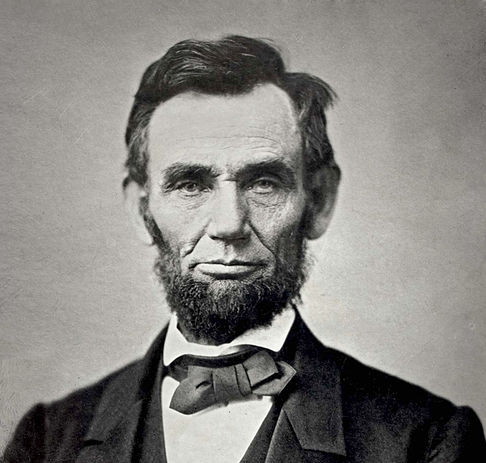 Last Tuesday, February 12, but in 1809, that the man who would become the 16th American President, Abraham Lincoln was born. While young, Lincoln abandoned Christianity in favor of Deism, but with an eye to his political career, a friend persuaded Lincoln to burn a manuscript he had written, one denying the divinity of Jesus and arguing for Deism against Christianity (this is attested by Colonel Ward H. Lamon, a longtime friend). Though he read the Bible and accompanied his wife to church, Lincoln himself never joined any church. Religious writers admit that he rarely spoke publicly about religion, so their claims that he privately converted, or admitted his deep Christian devotion to clerical strangers, seem rather desperate: he was a politician and had to appeal to a Christian majority. Besides, even if he was a secret Christian, Lincoln was remarkably reticent about speaking his Savior’s name! William H. Herndon, Lincoln’s law partner for 22 years, said Lincoln had no religious convictions. J.E. Remsbury and Charles G. Leland conclude that although occasionally superstitious, Lincoln was not a Christian. Friend and political manager Colonel James H. Matheny said, “I knew Lincoln … was an Infidel. … I never heard that Lincoln changed his views… Sometimes Lincoln bordered on Atheism.” Even his Second Inaugural Address (Washington, DC; March 4, 1865) seems equal parts Deist and secularist, especially in that Lincoln appears to distance himself from a personal belief in God by using the third person plural (“the believers”), rather than the first person plural (e.g. “we believers”). Since he was fatally wounded by an assassin on 14 April 1865, and died the next day, Abraham Lincoln had no opportunity to renounce his Deism.
Last Tuesday, February 12, but in 1809, that the man who would become the 16th American President, Abraham Lincoln was born. While young, Lincoln abandoned Christianity in favor of Deism, but with an eye to his political career, a friend persuaded Lincoln to burn a manuscript he had written, one denying the divinity of Jesus and arguing for Deism against Christianity (this is attested by Colonel Ward H. Lamon, a longtime friend). Though he read the Bible and accompanied his wife to church, Lincoln himself never joined any church. Religious writers admit that he rarely spoke publicly about religion, so their claims that he privately converted, or admitted his deep Christian devotion to clerical strangers, seem rather desperate: he was a politician and had to appeal to a Christian majority. Besides, even if he was a secret Christian, Lincoln was remarkably reticent about speaking his Savior’s name! William H. Herndon, Lincoln’s law partner for 22 years, said Lincoln had no religious convictions. J.E. Remsbury and Charles G. Leland conclude that although occasionally superstitious, Lincoln was not a Christian. Friend and political manager Colonel James H. Matheny said, “I knew Lincoln … was an Infidel. … I never heard that Lincoln changed his views… Sometimes Lincoln bordered on Atheism.” Even his Second Inaugural Address (Washington, DC; March 4, 1865) seems equal parts Deist and secularist, especially in that Lincoln appears to distance himself from a personal belief in God by using the third person plural (“the believers”), rather than the first person plural (e.g. “we believers”). Since he was fatally wounded by an assassin on 14 April 1865, and died the next day, Abraham Lincoln had no opportunity to renounce his Deism.
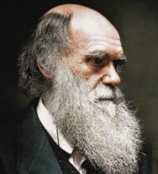 Also last Tuesday, February 12, but in 1809, British naturalist Charles Darwin was born. He was set to study theology at Christ’s College, Cambridge, but gave it up for a chance to study nature aboard the HMS Beagle, during a voyage to Patagonia (South America) and back. The 1831-1836 voyage was a life-changing experience for Darwin: his collection and analysis of specimens from nature across a wide area of the earth led to his formulation and publication of the theory of evolution by natural selection. Darwin published the first edition of On the Origin of Species in 1859 and explored evolution’s applicability to humankind in 1871 with The Descent Of Man. The response in the scientific community was electric. But in the religious community, the response ranged from dismissive to panic-stricken against the science that is now the bedrock of biology. Although accepting evolution does not necessarily entail rejecting religion, Darwin’s own religious views evolved from a passable piety to deep skepticism. In 1873, Darwin wrote, “I am aware that if we admit a first cause, the mind still craves to know whence it came, and how it arose. Nor can I overlook the difficulty from the immense amount of suffering through the world. … The safest conclusion seems to me that the whole subject is beyond the scope of man’s intellect…” “In my most extreme fluctuations,” wrote Darwin in 1879, “I have never been an Atheist in the sense of denying the existence of a God. I think that generally (and more and more as I grow older), but not always, that an Agnostic would be the more correct description of my state of mind.” And in an autobiographical essay, Darwin admitted, “I was very unwilling to give up my belief … But I found it more and more difficult, with free scope given to my imagination, to invent evidence which would suffice to convince me. Thus disbelief crept over me at a very slow rate, but was at last complete. The rate was so slow that I felt no distress.” And his deathbed recantation? According to his eldest son Francis, Charles Darwin’s last words were “I am not the least afraid to die.”
Also last Tuesday, February 12, but in 1809, British naturalist Charles Darwin was born. He was set to study theology at Christ’s College, Cambridge, but gave it up for a chance to study nature aboard the HMS Beagle, during a voyage to Patagonia (South America) and back. The 1831-1836 voyage was a life-changing experience for Darwin: his collection and analysis of specimens from nature across a wide area of the earth led to his formulation and publication of the theory of evolution by natural selection. Darwin published the first edition of On the Origin of Species in 1859 and explored evolution’s applicability to humankind in 1871 with The Descent Of Man. The response in the scientific community was electric. But in the religious community, the response ranged from dismissive to panic-stricken against the science that is now the bedrock of biology. Although accepting evolution does not necessarily entail rejecting religion, Darwin’s own religious views evolved from a passable piety to deep skepticism. In 1873, Darwin wrote, “I am aware that if we admit a first cause, the mind still craves to know whence it came, and how it arose. Nor can I overlook the difficulty from the immense amount of suffering through the world. … The safest conclusion seems to me that the whole subject is beyond the scope of man’s intellect…” “In my most extreme fluctuations,” wrote Darwin in 1879, “I have never been an Atheist in the sense of denying the existence of a God. I think that generally (and more and more as I grow older), but not always, that an Agnostic would be the more correct description of my state of mind.” And in an autobiographical essay, Darwin admitted, “I was very unwilling to give up my belief … But I found it more and more difficult, with free scope given to my imagination, to invent evidence which would suffice to convince me. Thus disbelief crept over me at a very slow rate, but was at last complete. The rate was so slow that I felt no distress.” And his deathbed recantation? According to his eldest son Francis, Charles Darwin’s last words were “I am not the least afraid to die.”
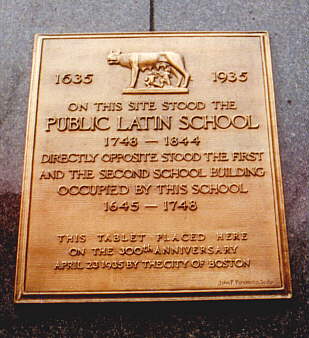 Last Wednesday, February 13, but in 1635, the first U.S. public school was founded, by the selection of a headmaster (Philemon Pormont) for Boston Latin School. Although founded by a clergyman and devout theocrat, Rev. John Cotton, throughout the history of Christianity the churches have been either indifferent to, or hostile to, public education. Yes, Christian communities opened a few schools as Rome was decaying – but only after Christians had succeeded in destroying what even Augustine of Hippo had judged a fine system of free public education under pagan Rome. Most unbiased histories of education will point out the embarrassing facts about the Christian indifference toward education during most of the Christian era: From 450 to 1800, free public education was nearly unknown in Christian civilization; what education there was consisted largely of preparation for church duties, with little science and secular literature; the educational efforts of Charlemagne (742-814) were meager and did not survive him; the monks, far from preserving them, destroyed many ancient classics; most priests were too illiterate to read the Mass; the library at Canterbury, one of the best in England, possessed only 1,800 volumes, yet the Library of Congress today has over 119,000,000 items; illiteracy in Europe was 95-99% until the 1800s; it is in single digits in the secular West today. As Ingersoll said, education is “the only lever capable of raising mankind.” It follows that those bent on keeping the populace ignorant, poor, miserable and obedient would oppose free public education. Those bent on raising humanity, supporting democratic institutions, advancing equality of opportunity, retarding class envy and making the working class competitive – and, by the way, increasing the sum of human happiness – would support universal education: a public good at public expense, and under public rather than corporate control.
Last Wednesday, February 13, but in 1635, the first U.S. public school was founded, by the selection of a headmaster (Philemon Pormont) for Boston Latin School. Although founded by a clergyman and devout theocrat, Rev. John Cotton, throughout the history of Christianity the churches have been either indifferent to, or hostile to, public education. Yes, Christian communities opened a few schools as Rome was decaying – but only after Christians had succeeded in destroying what even Augustine of Hippo had judged a fine system of free public education under pagan Rome. Most unbiased histories of education will point out the embarrassing facts about the Christian indifference toward education during most of the Christian era: From 450 to 1800, free public education was nearly unknown in Christian civilization; what education there was consisted largely of preparation for church duties, with little science and secular literature; the educational efforts of Charlemagne (742-814) were meager and did not survive him; the monks, far from preserving them, destroyed many ancient classics; most priests were too illiterate to read the Mass; the library at Canterbury, one of the best in England, possessed only 1,800 volumes, yet the Library of Congress today has over 119,000,000 items; illiteracy in Europe was 95-99% until the 1800s; it is in single digits in the secular West today. As Ingersoll said, education is “the only lever capable of raising mankind.” It follows that those bent on keeping the populace ignorant, poor, miserable and obedient would oppose free public education. Those bent on raising humanity, supporting democratic institutions, advancing equality of opportunity, retarding class envy and making the working class competitive – and, by the way, increasing the sum of human happiness – would support universal education: a public good at public expense, and under public rather than corporate control.
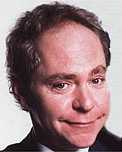 Last Thursday, February 14, but in 1948, the American magician and comedian known by the single name of Teller was born. Teller is the non-speaking half of the Penn & Teller act, but they are both outspoken and often funny atheists. In a 2001 interview, Pete Moss asked Teller: “Being as how you spent your life saying God is a phony, would you still feel you have a valid claim to spend eternity in Paradise if you turn out to be wrong?” Teller replied, “Wouldn't want to. I can’t play the harp and look fat in chiffon.” In a 1998 interview, Teller was asked if even the most hardened Atheist has a need to believe and that even Atheists “search for some kind of personal answers for existence itself.” Teller replied, “Atheists do look for answers to existence itself. They just don't make them up.” Teller's partner, Penn Jillette, tells of a 1998 appearance on Donny and Marie Osmond's syndicated talk show: “We were asked to do autographs for Donny and Marie. I wrote, ‘There is no god,’ and Teller wrote, ‘He's right.’”
Last Thursday, February 14, but in 1948, the American magician and comedian known by the single name of Teller was born. Teller is the non-speaking half of the Penn & Teller act, but they are both outspoken and often funny atheists. In a 2001 interview, Pete Moss asked Teller: “Being as how you spent your life saying God is a phony, would you still feel you have a valid claim to spend eternity in Paradise if you turn out to be wrong?” Teller replied, “Wouldn't want to. I can’t play the harp and look fat in chiffon.” In a 1998 interview, Teller was asked if even the most hardened Atheist has a need to believe and that even Atheists “search for some kind of personal answers for existence itself.” Teller replied, “Atheists do look for answers to existence itself. They just don't make them up.” Teller's partner, Penn Jillette, tells of a 1998 appearance on Donny and Marie Osmond's syndicated talk show: “We were asked to do autographs for Donny and Marie. I wrote, ‘There is no god,’ and Teller wrote, ‘He's right.’”
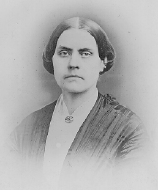 Yesterday, February 15, but in 1820, American feminist and social reformer Susan B. Anthony was born into a strict Quaker family. Nevertheless, “I was born a heretic,” she said. “I always distrust people who know so much about what God wants them to do to their fellows.” Her association with Elizabeth Cady Stanton (1815-1902), led her to join the Feminist movement in 1852, to which she eventually dedicated her life. It is a characteristic of the early days of social reform movements that the pioneers were almost wholly Freethinkers, Agnostics, Deists and even Atheists. So it was with Anthony, who was careful to keep her Woman Suffrage platform broad, but said, “I tell them I have worked 40 years to make the platform broad enough for Atheists and Agnostics to stand upon, and now if need be I will fight the next 40 to keep it Catholic enough to permit the straightest Orthodox religionist to speak or pray and count her beads upon.” She mostly kept her Agnosticism to herself, but elsewhere Anthony said, “What you should say to outsiders that a Christian has neither more nor less rights in our Association than an atheist. When our platform becomes too narrow for people of all creeds and of no creeds, I myself shall not stand upon it.” The first historical woman to have her image on a U.S. coin, Susan B. Anthony once said, “The religious persecution of the ages has been done under what was claimed to be the command of God.”
Yesterday, February 15, but in 1820, American feminist and social reformer Susan B. Anthony was born into a strict Quaker family. Nevertheless, “I was born a heretic,” she said. “I always distrust people who know so much about what God wants them to do to their fellows.” Her association with Elizabeth Cady Stanton (1815-1902), led her to join the Feminist movement in 1852, to which she eventually dedicated her life. It is a characteristic of the early days of social reform movements that the pioneers were almost wholly Freethinkers, Agnostics, Deists and even Atheists. So it was with Anthony, who was careful to keep her Woman Suffrage platform broad, but said, “I tell them I have worked 40 years to make the platform broad enough for Atheists and Agnostics to stand upon, and now if need be I will fight the next 40 to keep it Catholic enough to permit the straightest Orthodox religionist to speak or pray and count her beads upon.” She mostly kept her Agnosticism to herself, but elsewhere Anthony said, “What you should say to outsiders that a Christian has neither more nor less rights in our Association than an atheist. When our platform becomes too narrow for people of all creeds and of no creeds, I myself shall not stand upon it.” The first historical woman to have her image on a U.S. coin, Susan B. Anthony once said, “The religious persecution of the ages has been done under what was claimed to be the command of God.”
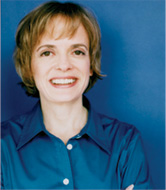 Today, February 16, but in 1958, nonfiction writer and a science journalist Natalie Angier was born. Angier wrote about biology for Discover Magazine, then became science writer for Time magazine. As science reporter for the New York Times, Angier won the 1991 Pulitzer Prize for beat reporting, then the AAAS Kavli Science Journalism Award the next year. Angier has written several books: Natural Obsessions (1988), with insights on the process and personalities in cancer research, Woman: an Intimate Geography (1999), a stereotype-debunking tour of female anatomy and physiology and The Canon: A Whirligig Tour of the Beautiful Basics of Science (2007), a layperson’s guide to science literacy. True to her discipline, Angier refuses to go beyond evidence and empiricism, even in matters of religion. In a 2001 essay, Angier admits, “So, I’ll out myself. I’m an Atheist. I don’t believe in God, Gods, Godlets or any sort of higher power beyond the universe itself, which seems quite high and powerful enough to me. I don’t believe in life after death, channeled chat rooms with the dead, reincarnation, telekinesis or any miracles but the miracle of life and consciousness, which again strike me as miracles in nearly obscene abundance. I believe that the universe abides by the laws of physics, some of which are known, others of which will surely be discovered…” She is still a science journalist for the New York Times. It was Natalie Angier who said, “I may not believe in life after death, but what a gift it is to be alive now.”
Today, February 16, but in 1958, nonfiction writer and a science journalist Natalie Angier was born. Angier wrote about biology for Discover Magazine, then became science writer for Time magazine. As science reporter for the New York Times, Angier won the 1991 Pulitzer Prize for beat reporting, then the AAAS Kavli Science Journalism Award the next year. Angier has written several books: Natural Obsessions (1988), with insights on the process and personalities in cancer research, Woman: an Intimate Geography (1999), a stereotype-debunking tour of female anatomy and physiology and The Canon: A Whirligig Tour of the Beautiful Basics of Science (2007), a layperson’s guide to science literacy. True to her discipline, Angier refuses to go beyond evidence and empiricism, even in matters of religion. In a 2001 essay, Angier admits, “So, I’ll out myself. I’m an Atheist. I don’t believe in God, Gods, Godlets or any sort of higher power beyond the universe itself, which seems quite high and powerful enough to me. I don’t believe in life after death, channeled chat rooms with the dead, reincarnation, telekinesis or any miracles but the miracle of life and consciousness, which again strike me as miracles in nearly obscene abundance. I believe that the universe abides by the laws of physics, some of which are known, others of which will surely be discovered…” She is still a science journalist for the New York Times. It was Natalie Angier who said, “I may not believe in life after death, but what a gift it is to be alive now.”
Other birthdays this week—
February 10: German dramatist Bertolt Brecht was born (1898).
February 12: American film director, screenwriter and film producer Darren “Requiem for a Dream” Aronofsky was born (1969).
February 15: Italian physicist, mathematician, astronomer, and philosopher Galileo Galilei was born (1564).
February 15: British philosopher, jurist, and social reformer Jeremy Bentham was born (1748).
February 15: German-born British South African philanthropist Alfred Beit was born (1748).
We can look back, but the Golden Age of Freethought is now. You can find full versions of these pages in Freethought history at the links in my blog, FreethoughtAlmanac.com.

